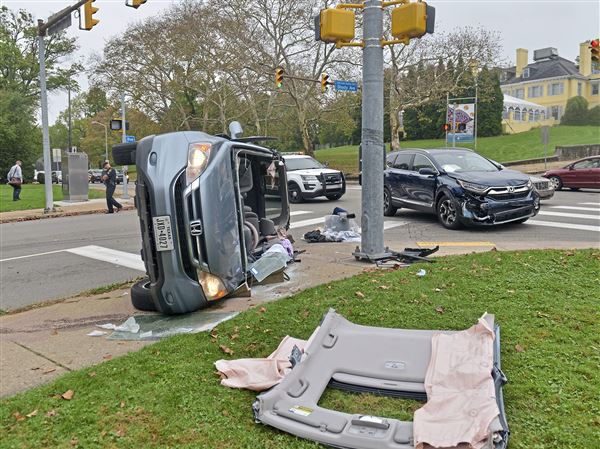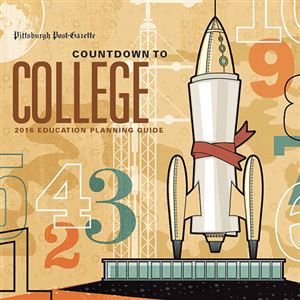Haydon Alexander and Cherisse Tompkins both are juniors at Winchester Thurston School and planning to attend college, but each is taking different approaches to college entrance exams.
Next month, Haydon, of Freedom, who hopes to study education at Arcadia University, will take the first administration of the newly revised SAT, and he plans to take the ACT later as well.
“I want to figure out which one works best for me,” Haydon said.
Cherisse of Squirrel Hill had originally planned to take the old version of the SAT but, buoyed by her scores from last fall’s PSAT/NMSQT, which is based on the new version of SAT, she decided against the old exam and signed up for the new SAT, which will be administered next month. Cherisse, who hopes to study performing arts at Carnegie Mellon University, plans to skip the ACT.
“I think the SAT suits me better than the ACT does. I’m stronger in my writing skills and math skills than my science,” Cherisse said.
Perhaps more than ever, students are choosing whether to take one, both or neither college entrance exam. More than 850 four-year colleges and universities don’t use the SAT or ACT to admit “substantial numbers” of bachelor degree applicants, according to the National Center for Fair and Open Testing, a nonprofit known as FairTest. Some colleges consider the scores in awarding merit scholarships.
In the high school graduating class of 2015 nationwide, 1.7 million students took the SAT while 1.9 million took the ACT. While participation in the ACT has been growing, the SAT remains more popular in Pennsylvania, with 96,826 or about 70 percent of the class of 2015 taking the test. The ACT was taken by 29,776 members of that class in the state.
David Seward, director of counseling at Winchester Thurston School, recommends taking college entrance exams as a junior, allowing time for more study and re-takes to try to improve the scores, if necessary. He also recommends taking a college entrance exam even if the students’ potential colleges don’t require it because it leaves open the potential for students to change their minds about where to apply. But he said there isn’t any “blanket advice” as to what tests to take.
“Most of our students are still taking the SAT over the ACT, but especially in the last five years, we see more and more students taking both exams at least to begin with to get an idea of which one to move forward with,” Mr. Seward said.
The SAT traditionally had a verbal and math section, each worth 800 points but about a decade ago, the test was changed to include three sections, each worth 800 points: Critical reading, math and writing.
Next month, the test changes again. The new version has two 800-point sections -- math, and evidence-based reading and writing – as well as an optional essay.
The ACT has four sections – English, math, reading and science – and an optional writing test. Students earn scores for each section, with the scores of the four required sections being used to determine a composite score of up to 36.
The SAT costs $54.50 with the essay and $43 without. The SAT also offers subject tests, with a registration fee of $26 plus $18 or $26 for each test. The ACT costs $56.50 with writing and $39.50 without. Both testing organizations offer fee waivers for low-income students, available by asking a high school counselor.
Those who take the redesigned SAT on March 5 will find significant differences over the old version.
There is no longer a penalty for wrong answers; math will focus on key topics; and reading answers will require evidence to support them. The essay will be based on evaluating evidence, not just writing from personal knowledge and experience as was the case in the old essay.
Samantha Stewart, the English teacher leader at Quaker Valley High School, said the English-related changes better reflect what students are learning in class, including the Common Core. “Students are being asked to complete tasks and learn vocabulary which will benefit them in their college and workplace,” she said.
Many experts recommend preparing for college entrance exams. Private tutoring or classes offered by tutoring companies, such as Princeton Review or Kaplan Test Prep, can run hundreds or even thousands of dollars.
But there are some free options as well. The online Khan Academy offers anyone official free SAT prep online at www.khanacademy.org/sat. The ACT automatically provides students who register for the ACT test for this month or later using a low-income fee waiver free access to its online prep, actstudent.org/onlineprep, which regularly costs $39.95 a year.
Some high schools offer their students free college entrance exam prep classes. Some test prep service offer a free practice test without requiring the student to register for classes or tutoring.
Hannah Bablak, of Bell Acres and a senior at Quaker Valley, practiced with a tutor and believes practice – whether with a tutor, in a class or one one’s own – is important to gain familiarity with the tests.
Hannah, who applied to 12 colleges and is interested in the pre-med track, took the SAT once, the ACT twice and three SAT subject tests, each once.
Hannah advises taking both to see which is a better fit and practicing. “It really does help your score,” she said.
Eleanor Chute: localnews@post-gazette.com
First Published: February 12, 2016, 5:00 a.m.























